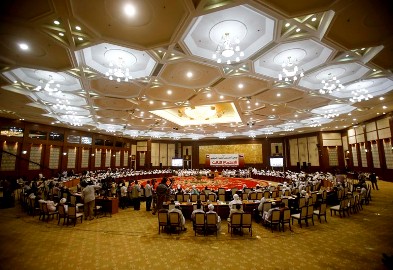Sudan’s dialogue body allegedly manipulated lists of independent figures
August 21, 2015 (KHARTOUM) – Some of the political forces who pulled out of the government-led national dialogue process claimed that the coordination body known as 7+7 mechanism has changed names of the dialogue’s national figures, conciliators and heads of committees.

However, the JPF recently rejoined the internal political process, ending the suspension of its participation.
Sources close to the process told Sudan Tribune that the 7+7 mechanism had agreed before the withdrawal of the NUP, RNM, JPF and other parties on specific names to be included in the lists of the national figures, conciliators and committees, stressing those names have been changed without reasons.
The same sources described the names which have been announced during the general assembly of the dialogue process on Thursday as “fraudulent”, saying the government has replaced names of unwanted figures by others close to it.
The leader of the Popular Congress Party (PCP) Hassan al-Turabi stressed on Thursday on the need to include rebel groups in the process. But he didn’t insist on the holdout political opposition forces .
RNM leading figure, Mahmoud Zahir al-Jamal, expected the national dialogue would lead to a bilateral deal between the NCP and the PCP, saying his party would not participate in the dialogue unless the Addis Ababa agreement and the roadmap are being implemented.
He was alluding to the roadmap approved by the 7+7 mechanism and the Addis Ababa agreement signed between the mechanism and the Paris Declaration forces including the NUP and the rebel umbrella Sudan Revolutionary Front (SRF).
The sources said that former chief justice Dafa` Allah Hag Youssef has been removed from the list of the five conciliators although his name was approved by consensus.
They added that several others figures known for their independence or objective criticism for the government have been removed from the committees including the alternate chairpersons of the fundamental rights and freedoms, al-Tayeb Zain al-Abdin, peace and unity committee Ali Ahmed Suleiman, foreign relations committee, Suad Ibrahim Issa and the chairman of the governance issues and implementation of the dialogue outcome, Mahgoub Mohamed Salih.
The same sources pointed that named who have been removed from the list of the fifty national figures included Mustafa Idris, Mohamed Ali al-Gizouli, Mahgoub Hassan Sa’ad, Mudawi Ibrahim Adam, Abdel-Wahab al-Afandi, Amar al-Tahir, Hassan Mekki, Ahmed Mahmoud Mohamed, Ahmed Kamal al-Din, Mansour Abdel-Rahim, Fatima Mansour, Hashim Salah Hassan Matar, Osman Abdallah, Elsheikh Musa Abdallah Hussein and Obaid Hag Ali.
However, the secretary general of the Justice Party (JP) and member of the 7+7 mechanism, Bishara Guma’a Aror, denied to Sudan Tribune any changes in the names of the dialogue’s conciliators, national figures and heads of the committees.
He said the names have been declared after they were approved by the mechanism, saying some people have been replaced after they declined to take over the task for special circumstances.
Aror described those who throw such accusations as “tendentious”, saying they have taken negative stances towards the national dialogue initiative.
It is worth noting that the 7+7 mechanism has named five conciliators including the former president Abdel-Rahman Swareldahab, Kamal Shadad, Youssef Fadl Hassan, Ibrahim Muni’m Mansur and Ahmed Ibrahim Diraig.
It also named several heads of committees including, Mohamed al-Amin Khalifa for the peace committee, al-Tigani al-Tayeb for the economics committee, Omer Abdel-Ati for the fundamental rights and freedoms committee, Ali Osman Mohamed Salih for the committee on identity, Kamil Idris for the foreign relations committee and Barakat Musa al-Hawati for the governance issues and implementation of the dialogue outcome.
The political and armed groups opposed to the dialogue process refuse to join it under the current conditions asking to stop war and to ensure political freedoms.
In a speech before the general assembly of the dialogue process on Thursday, the Sudanese president Omer al-Bashir expressed readiness to declare a two-month ceasefire in Blue Nile, South Kordofan states and Darfur region and renewed his offer of amnesty for the rebel who are willing to join the national dialogue.
(ST)
